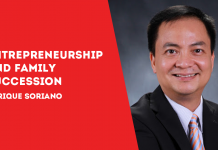
BY PROF. ENRIQUE SORIANO
PRESERVING the family legacy to be enjoyed by generations upon generations requires a common and collective sense of purpose reinforced with shared values passed down by the founders of the family enterprise.
The popular saying that “wealth shall not pass three generations” is actually incorrect as amplified by so many conflicted families belonging to the second and third generation. As I write this article, chaos has overwhelmed many families caught in a crossfire replete with drama, with some resorting to the courts and even physically hurting each other.
In reality, conflicts usually emerge as early as in the first generation when founders and their offspring manifest differing ideas and expectations on how to run the business. When generational conflict, pride and egos collide with no documented rules in managing conflict, relationships can slide downhill.
This phase known as entropy sets the stage for a major finale before the breakup. It is no revelation that conflict often ensues when the founder does not define the rules of engagement amongst its active and non-active next generation offspring. The shock happens when the founder dies or becomes incapacitated.
Though the third generation curse appears to be empirically sound, that a mere 13 percent of family businesses managed to transition to the third generation, in reality, whatever wealth (and relationships) was generated during the life of the first generation, it can be inferred that they will erode. When shared values are no longer aligned and trust has been compromised, the principles that guide family members on how they interact with each other, both inside and outside of the family enterprise will start to break.
Royal Selangor circa 1885
Let’s take the case of the Yong family of the global brand Royal Selangor Group. It is a Malaysian pewter manufacturer and retailer established in 1885 and recognized as the largest of its type in the world.
Royal Selangor has a remarkable history built over five generations. Yet, despite its market dominance in the global market, the family business has not been spared its share of family conflict. Founded by Yong Koon, Royal Selangor has weathered global recessions, and survived two world wars as well as the boom and bust cycle of the tin industry, including a bitter family feud.
With the Second World War and family tensions simmering, the Yong family divided into three separate pewter companies. The feud between Yong Koon’s sons would lead to the formation of three other pewter companies – Tiger Pewter, Selangor Pewter and Lion Pewter of which only Royal Selangor survives to this day.
Third generation successor Yong Poh Kon shared his thoughts on succession and stewardship, “My father told me to beware of family feuds. If you have family members contesting over the pot, then nobody looks after enlarging the pot. We are merely stewards of the family wealth which is to be enjoyed over successive generations.”
For all this fame and fortune, the family has “proper succession planning and a family charter in place” to thank, notes Yoon Li, who runs the business with cousin Chen Tien Yue, making them the fourth generation to do so. For them, formulating a Family Charter which took them close to four years to complete, was the best thing that ever happened to their family enterprise.
And to prevent a repeat of a damaging family feud, a six-member family council along with a family charter, were established in 2002 with guidelines to handle potential disputes. Yoon Li says his family’s charter has gone through at least 30 iterations since it was implemented. It was put in place to ensure that the family business “was not considered a place of occupation for family members or an employer of last resort.”
Rules of Engagement
That is why essential to all business organizations is the call to crystalize the rules of engagement and that includes the family’s vision and collective purpose on why family members must work in harmony together. And with inherent trust among the members, the business’s leadership can talk, discuss, and disagree more openly and freely, with respect.
In my research of successful family owning businesses in Asia, they usually have a supporting governance framework backed by a family agreement or Constitution and a legally enforceable shareholders agreement that defines a common purpose and shared values to support family unity and preserve the family legacy./PN





